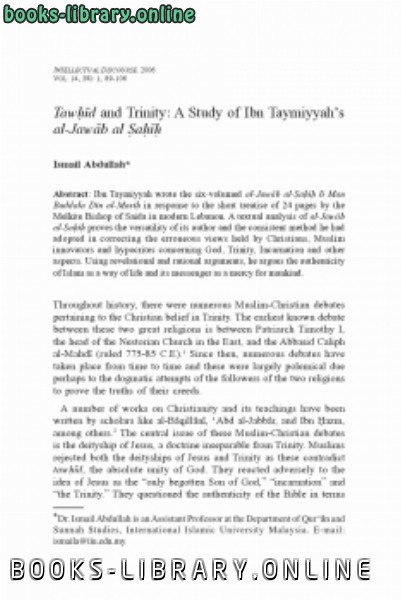📘 قراءة كتاب Tawhid and Trinity A Study of Ibn Taymiyyah’s al Jawab al sahih أونلاين


ترك ابن تيمية مجموعة كبيرة من الأعمال التي تتميز
بتوثيقها الغني وأسلوبها الرصين والجدل اللامع. بالإضافة
إلى عدد لا يحصى
<�ont style="vertical-align: inherit;">fatÉwÉ
(الآراء القانونية)، وتلقى عملين
اهتماما خاصا:
آل SiyÉsat الشرع
≤
iyyah
(الاطروحه على القضاء
السياسة) و
منهاج آل السنة
(الطريق من التقليد). ومع ذلك ، فإن
دراسته ذات الستة مجلدات ،
"الجويب القديم لرجل بدالة الدين الماسي" (الإجابة
الملائمة
لمن غير دين
المسيح) تستحق الاهتمام نفسه. كما كتب ابن تيمية خمسة
أطروحات أخرى ردا على المسيحية.
8
ومع ذلك ،
تركز هذه الدراسة بشكل أساسي على المنهجية والحجج المقدمة في
جويب الجواب.
المحتويات والطريقة
: جواب الأصحاب
يحتوي على معلومات غنية عن الإسلام والمسيحية
ومثل هذه الطوائف الإسلامية المنقرضة التي انجذبت إلى المسيحية.
كُتب هذا العمل عام 1320 بناءً على طلب عام واستجابة
لأطروحة قصيرة من 24 صفحة بعنوان "رسالة إلى مسلم" كتبها بولس
الأنطاكي ، أسقف صيدا الملكيين.
9
هذه الرسالة ، التي كُتبت بعد
التشاور الواجب مع قادة الكنيسة ، تحاول تحديد ست نقاط.
يزعمون أن: (1) النبي محمد (صلى الله عليه وسلم) لم يرسل
للبشرية بل إلى العرب الوثنيين. (2) النبي محمد صلى الله عليه وسلم
أشاد بالمسيحية كدين. (3) الأديان
والكتب المقدسة السابقة تشهد على حقيقة وصحة دينهم ؛
(4) المسيحيون موحدون. (5) إيمانهم بالثالوث
يمكن إثباته بالحجج العقلانية. و (6) المسيحية
كدين أتقنها السيد المسيح الذي جاء بعد موسى وبالتالي فهم
ليسوا بحاجة إلى أي رسالة أو دين جديد.
وردا على ذلك، كتب ابن تيمية في ستة مجلدات نشرته
دير آل
≤
يمة للنشر ، الرياض. المجلد الأول يحلل
مطالبة المسيحيين أن MuÍammad (SAS) وأرسلت فقط للعرب
من
JÉhiliyyah
فترة ويجادل بأن النبي MuÍammad (SAS)
أرسل رسولا للبشرية جمعاء. يحاول المجلد الثاني
إثبات أن المسيحيين شوهوا (
تحريف
) كتبهم المقدسة وغيّروا
(
تابدل
) مبادئ معتقداتهم.
يُخصص المجلدان الثالث والرابع لمسألة الثالوث التي تشرح
الأصول العقائدية لهذا الاعتقاد ، وموقعه اللاهوتي ،
والأسس الوحيوية والعقلانية التي يقوم عليها هذا الاعتقاد. انه يجادل
أن عقيدة الثالوث هي ابتكار لا أساس له من قبل
R
ESEARCH
N
OTES
93
أي أوامر رسمية. في المجلد الخامس ،
يقدم ابن تيمية أسئلة معرفية حول مفهوم الثالوث ،
لا سيما العلاقة المنطقية بين المعرفة الفكرية (
≤
العقل
)
والمعرفة المستمدة من التقليد الموحى
(
النقل
). يلخص المجلد الأخير الحجج ويختتم
بإظهار تفوق الإسلام وضرورته ، وهو
مزيج مثالي من كل ما هو جيد وعادل. الكتاب يعلم المسلمين
وآخرين كيف يفكرون عند دراسة المسيحية. يقدم
الحجج المنطقية والكتابية في دحضه للمسيحية.
يوضح ابن تيمية في مقدمة المجلد
أن نيته ليست سرد الطوائف المسيحية
وخلفيتها التاريخية ، ولكن لتحليل مواقفهم الدينية ومفاهيمهم
عن الله والثالوث والتجسد والمعتقدات المسيحية الأخرى. هدفه الرئيسي
هو إثبات التمييز بين الخالق
وإبداعاته. نظرًا لأن الله هو "الكائن المثالي للمملكة" والذي يختلف تمامًا
عن عالم الوجود الفعلي أو الخلق ، فهو حقًا
والوجود المتعالي فقط. تستند تقييماته إلى
التحليلات الكتابية واللاهوتية.
على الرغم من أن
الجويب العتيق
يهتم بالمسيحية التي
انحرفت عن تعاليم نبيها الأصلية ، إلا أنها تناقش أيضًا
بعض الممارسات الهرطقية بين المسلمين. لقد سعى لإثبات
أن أخطاء المسيحيين في "تغيير دين المسيح" كانت
سائدة أيضًا بين المسلمين من الأجيال السابقة وكذلك
معاصريه. يسميهم ابن تيمية المنافقين
والمبدعين. المنافقون هم أولئك الذين يؤمنون ظاهريًا بجميع
تعاليم النبي صلى الله عليه وسلم ، لكنهم يكرهون رسالته سرًا ،
مثل المرتدين (
malÉÍidah
) وBatinis. المرتدون ، حسب
ابن تيمية ، أخطأوا أكبر من المسيحيين ، في حين
أن المبتدعين هم أولئك الذين يصرحون بعمومية رسالة
النبي (صلى الله عليه وسلم) لكنهم مرتبكون بشأن التعاليم الصحيحة
للإسلام. ما لم يعيد المسلمون
بقلم إسماعيل عبد الله ، وهي رسالة مهمة تشرح لنا الخطأ في عقيدة التثليث لمحاكمات المسيحيين ، وفي المقابل تسلط الضوء على عقيدة التوحيد ، وهذه الرسالة مبنية على كتاب الشيخ إسلام ابن تيمية رحمه الله. والمعروف باسم الجواب الصحيح لمن حل محل دين المسيح ، الكثير من الأدلة والحجج العقلية والأقلية التي تثبت تحريف الدين المسيحي ، والخطأ والتناقض الواضح في الديانة الحالية
.
سنة النشر : 2006م / 1427هـ .
حجم الكتاب عند التحميل : 104.2 كيلوبايت .
نوع الكتاب : pdf.
عداد القراءة:
اذا اعجبك الكتاب فضلاً اضغط على أعجبني و يمكنك تحميله من هنا:

شكرًا لمساهمتكم
شكراً لمساهمتكم معنا في الإرتقاء بمستوى المكتبة ، يمكنكم االتبليغ عن اخطاء او سوء اختيار للكتب وتصنيفها ومحتواها ، أو كتاب يُمنع نشره ، او محمي بحقوق طبع ونشر ، فضلاً قم بالتبليغ عن الكتاب المُخالف:
 قبل تحميل الكتاب ..
قبل تحميل الكتاب ..
يجب ان يتوفر لديكم برنامج تشغيل وقراءة ملفات pdf
يمكن تحميلة من هنا 'http://get.adobe.com/reader/'


 منصّة المكتبة
منصّة المكتبة 